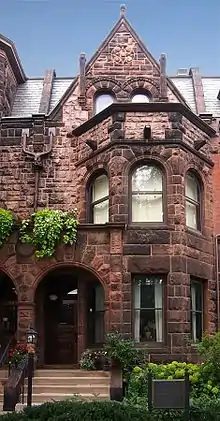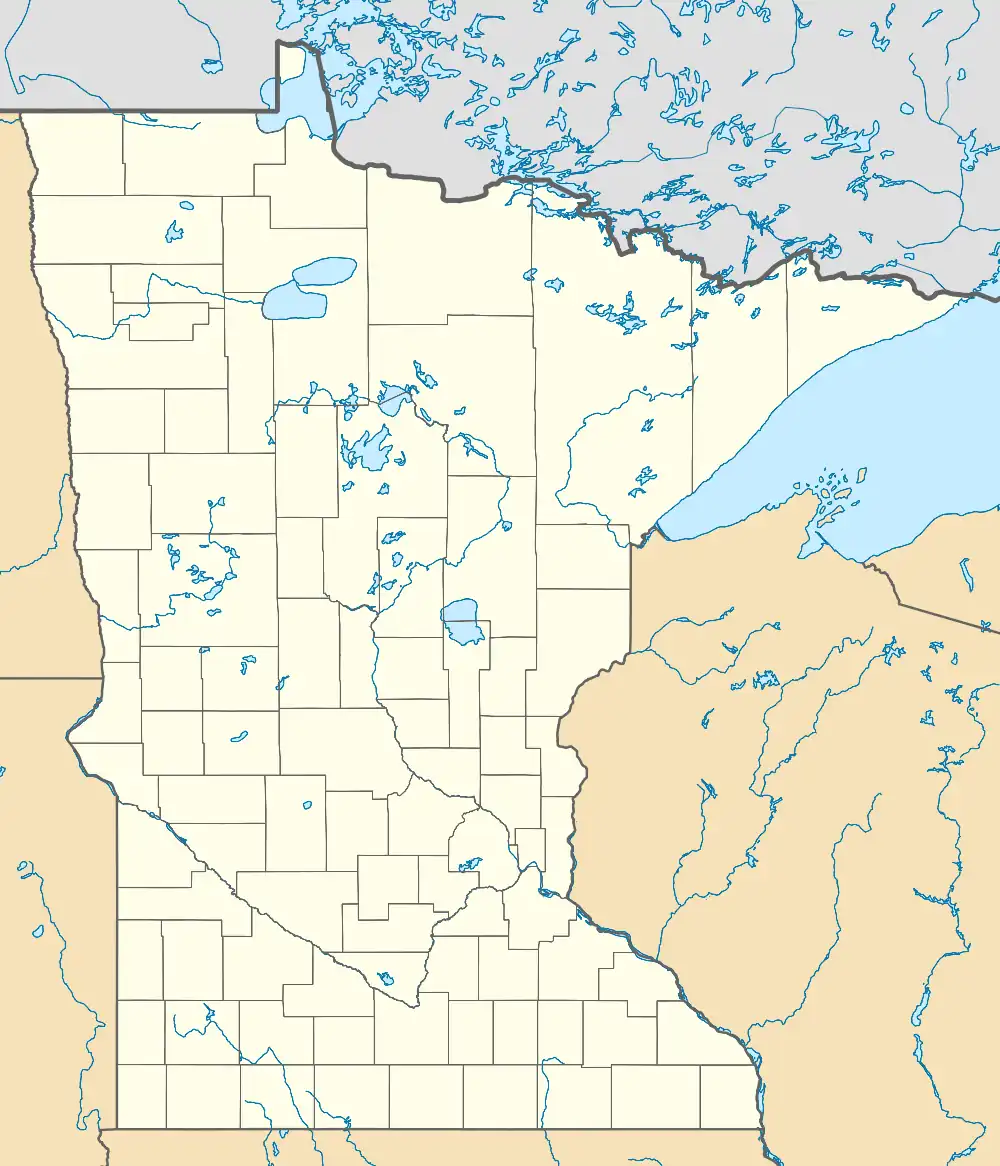F. Scott Fitzgerald House
The F. Scott Fitzgerald House, also known as Summit Terrace, in Saint Paul, Minnesota, United States, is part of a group of rowhouses designed by William H. Willcox and Clarence H. Johnston Sr. The house, at 599 Summit Avenue, is listed as a National Historic Landmark for its association with author F. Scott Fitzgerald. The design of the houses was described as the "New York Style" in which unit was given a distinctive character found in some rowhouses in eastern cities.[3] Architecture critic Larry Millett describes it as "A brownstone row house that leaves no Victorian style unaccounted for, although the general flavor is Romanesque Revival."[4] The Fitzgerald house is faced with brownstone and is two bays wide with a polygonal two-story window bay on the right, and the entrance, recessed under a round arch that is flush with the bay front, on the left. The mansard roof has a cross-gable with two round-arch windows and decorative finials.[5]
F. Scott Fitzgerald House | |
 The F. Scott Fitzgerald House, a rowhouse | |
  | |
Interactive map showing the location of F. Scott Fitzgerald House | |
| Location | 599 Summit Avenue Saint Paul, Minnesota |
|---|---|
| Coordinates | 44°56′29.5″N 93°7′30.5″W |
| Built | 1889 |
| Architect | William H. Willcox and Clarence H. Johnston Sr. |
| Architectural style | Late Victorian |
| Part of | Historic Hill District (ID76001067) |
| NRHP reference No. | 71000440 |
| Significant dates | |
| Added to NRHP | November 11, 1971[1] |
| Designated NHL | November 11, 1971[2] |
Fitzgerald's parents, Edward and Mollie, moved back to St. Paul in 1914 while F. Scott Fitzgerald was a student at Princeton University. They lived in the unit at 593 Summit Avenue for a while, then moved to the 599 Summit Avenue unit in 1918. In July and August 1919, Fitzgerald rewrote the manuscript that became his first novel, This Side of Paradise.[4] He lived here until January 1920, writing short stories, and then moved to New Orleans. Of the several places the Fitzgeralds lived, this one is most closely associated with his literary fame, and typifies the environments of some of his later works.[5]
It was declared a National Historic Landmark in 1971.[2][5] It is also a contributing property to the Historic Hill District, listed in 1976.[6]
F. Scott Fitzgerald was noted for disliking Summit Avenue, stating that Summit Avenue is “a mausoleum of American architectural monstrosities.” [7]
See also
References
- "National Register Information System". National Register of Historic Places. National Park Service. January 23, 2007.
- "F. Scott Fitzgerald House". National Historic Landmark summary listing. National Park Service. September 29, 2007. Archived from the original on October 12, 2007.
- Hess, Jeffrey A.; Clifford Larson (2006). St. Paul's Architecture: A History. Minneapolis, Minnesota: University of Minnesota Press. p. 60. ISBN 0-8166-3590-0.
- Millett, Larry (2007). AIA Guide to the Twin Cities: The Essential Source on the Architecture of Minneapolis and St. Paul. Minnesota Historical Society Press. p. 142. ISBN 978-0-87351-540-5.
- Robert Gamble; Edmund Preston. "National Register of Historic Places Inventory-Nomination: Summit Terrace / F. Scott Fitzgerald House" (pdf). National Park Service.
{{cite journal}}: Cite journal requires|journal=(help) and Accompanying 6 images (2.03 MB) - "Historic Hill District". Minnesota National Register Properties Database. Minnesota Historical Society. 2009. Archived from the original on April 15, 2013. Retrieved January 9, 2013.
- "Exploring the architecture and history of St. Paul's Summit Hill". Star Tribune.
External links
![]() Media related to F. Scott Fitzgerald House at Wikimedia Commons
Media related to F. Scott Fitzgerald House at Wikimedia Commons
- Lavoie, C. (historian) and Lowe, Jet (photographer). "F. Scott Fitzgerald House (Summit Terrace), MN0133, HABS MN-83". photos 28 October 1987, survey January 1989. Historic American Buildings Survey, National Park Service via Library of Congress. Retrieved October 25, 2007.
{{cite web}}: CS1 maint: multiple names: authors list (link)